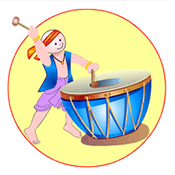
Dimdima
Online Children's Magazine from India

Dimdima
Online Children's Magazine from India

Did you know from where the word “Computer” comes from? The word computer originally referred to a person who did the calculation very fast, without the need of any mechanical devices. The idea for computer began with people who wanted to make calculations easier. In between 1000BC and 500BC, the abacus was invented in Babylonia, and this made calculation simpler. It actually was a computer made of strings and beads.
The first automatic calculator was invented in 1642 by Blasie Pascal. However, none of these devices could be compared to the computer as they could not be programmed. The first step in the direction of computers was taken in 1801 when Joseph Marie Jacquard invented a punch card machine that could be used for weaving. The card made sure that the threads went through the right order. It used codes in order to work.
The first device that might be considered as a computer in modern days was conceived in 1822 by the British mathematician and inventor Charles Babbage. In Babbage’s time, mathematical tables were carried out by a group of mathematicians who worked day and night on primitive calculations. In 1822 Babbage proposed building a machine know as ‘Difference Engine’ to automatically calculate these tables. The Difference Engine was only partially completed, when Babbage thought of building an easier machine known as ‘Analytical Engine’.
In the year 1890, new light flashed on the idea of computers. Mr. Herman Hollerith designed the first machine known as ‘Punch Card Machine’. This machine punched holes on card to store data or information. In the year 1945, the first general all purpose electronic computer was invented. It was ENIAC, short form for Electronic Numerical Integrator and Computer. ENIAC filled an entire room, weighed 30 tons, and consumed 200 kilowatts of power. Vacuum tubes, over 19,000 of them, were the principal elements in the computer’s circuitry. The second ENIAC invented could perform 5,000 additions, 357 multiplications or 38 divisions.
From 1945 to 1979, numerous computers were invented for different purposes. Vacuum tubes were replaced with the transistors in the second generation. In the third generation computers, integrated chip replaced transistors. In the fourth generation, thousands of integrated chips were built onto a single silicon chip known as microprocessor. Every year there is a new development in the field of technology. As a result, computer gained tremendous speed, accuracy and reliability. Even the size and cost have reduced.
Now a days super computers have been developed, which are the most powerful computers. The world's fastest super computer is named as ‘Cray XT5 Jaguar’. It is a machine that performs over two thousand trillion calculations per second! Eka is the fastest super computer of India. It can perform 117.9 trillion calculations per second! It has been rated the fourth fastest by the internationally recognized ‘Top500 listing’ projects.
Manjur Ansari
STD: 8
Bhavan’s GIPCL Academy,
Surat, Gujarat.
GAURAV KOLEY
Great article!!! Keep on writing articles like these Manjur.
AMIT
nice
EXPLORE MORE...
Dimdima is the Sanskrit word for ‘drumbeat’. In olden days, victory in battle was heralded by the beat of drums or any important news to be conveyed to the people used to be accompanied with drumbeats.
Bharatiya Vidya Bhavan
K. M Munshi Marg,
Chowpatty, Mumbai - 400 007
email : editor@dimdima.com
Bharatiya Vidya Bhavan
505, Sane Guruji Marg,
Tardeo, Mumbai - 400 034
email : promo@dimdima.com
Dimdima.com, the Children's Website of Bharatiya Vidya Bhavan launched in 2000 and came out with a Printed version of Dimdima Magazine in 2004. At present the Printed Version have more than 35,000 subscribers from India and Abroad.